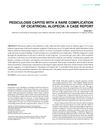 September 2016 in “Journal of Dermatology and Dermatologic Surgery”
September 2016 in “Journal of Dermatology and Dermatologic Surgery” A woman's severe hair loss was caused by scalp psoriasis, not the initially thought condition, and treatment improved her psoriasis but couldn't restore her lost hair.
 January 2025 in “International Journal of Advanced Research in Science Communication and Technology”
January 2025 in “International Journal of Advanced Research in Science Communication and Technology” The herbal hair oil effectively promotes hair growth, reduces dandruff, and is safe for all hair types.
2 citations,
September 2023 in “Cosmetics” Cannabinoids may help some skin conditions but more research is needed.
 141 citations,
September 2016 in “European Journal of Dermatology”
141 citations,
September 2016 in “European Journal of Dermatology” Taxane chemotherapy can cause skin, hair, and nail side effects, which are often under-reported and can affect patient quality of life.
 January 2020 in “Cosmetics”
January 2020 in “Cosmetics” Ecklonia cava extract may protect the scalp from pollution and improve its health.
 13 citations,
May 2022 in “Cell discovery”
13 citations,
May 2022 in “Cell discovery” The study found new details about human hair growth and suggests that preventing a specific biological pathway could potentially treat hair graying.
 February 2025 in “International Journal of Advanced Research in Science Communication and Technology”
February 2025 in “International Journal of Advanced Research in Science Communication and Technology” Fenugreek seeds may improve hair health and growth.
 56 citations,
August 2005 in “Journal of Investigative Dermatology Symposium Proceedings”
56 citations,
August 2005 in “Journal of Investigative Dermatology Symposium Proceedings” Different women's hair and skin glands respond to hormones in varied ways, which can cause unwanted hair growth even with normal hormone levels, and more research is needed to treat this effectively.
 67 citations,
January 2013 in “Indian Journal of Dermatology, Venereology and Leprology”
67 citations,
January 2013 in “Indian Journal of Dermatology, Venereology and Leprology” The document concludes that alopecia areata is an autoimmune disease without a definitive cure, but treatments like corticosteroids are commonly used.
 28 citations,
August 2013 in “Facial Plastic Surgery Clinics of North America”
28 citations,
August 2013 in “Facial Plastic Surgery Clinics of North America” Body and beard hair can be used for hair restoration in severely bald patients, but the technique is complex and costly.
 October 2024 in “JAAD Case Reports”
October 2024 in “JAAD Case Reports” Dutasteride mesotherapy showed mixed results and is not recommended as a primary treatment for hair loss.

Afro-textured hair is more fragile and prone to certain scalp conditions, requiring careful treatment and more research for effective management.

Some TikTok hair loss remedies like rosemary oil, onion juice, and garlic gel show promise, but more research is needed and they might delay proper treatment.
 7 citations,
August 2015 in “Journal der Deutschen Dermatologischen Gesellschaft”
7 citations,
August 2015 in “Journal der Deutschen Dermatologischen Gesellschaft” Scalp-to-scalp skin grafts quickly heal and hide well under regrown hair, making them good for repairing large scalp defects.
 January 2016 in “Elsevier eBooks”
January 2016 in “Elsevier eBooks” Trichoscopy is a key method for dermatologists to quickly and effectively diagnose hair and scalp conditions.
 30 citations,
December 2014 in “Toxicological Research”
30 citations,
December 2014 in “Toxicological Research” Peppermint oil can effectively promote hair growth without being toxic.
34 citations,
January 2022 in “Molecules/Molecules online/Molecules annual” Natural ingredients in cosmeceuticals are beneficial for skin and hair health with few side effects.
 19 citations,
August 2011 in “Facial Plastic Surgery Clinics of North America”
19 citations,
August 2011 in “Facial Plastic Surgery Clinics of North America” Hair grafting is a key method for improving scars, especially in areas with hair, by transplanting hair to hide the scar while maintaining its original characteristics.
 6 citations,
December 2022 in “Cell reports”
6 citations,
December 2022 in “Cell reports” Eating a high-fat fish oil diet caused mice to lose hair due to a specific immune cell activity in the skin linked to a protein called E-FABP.
 21 citations,
May 1996 in “Current problems in dermatology”
21 citations,
May 1996 in “Current problems in dermatology” Detailed patient history and physical exams are crucial for diagnosing hair loss.
 31 citations,
October 2005 in “British Journal of Dermatology”
31 citations,
October 2005 in “British Journal of Dermatology” Hair loss in women not always linked to increased oil production; other factors may be involved.
 August 2023 in “The Indonesian Biomedical Journal”
August 2023 in “The Indonesian Biomedical Journal” Rosemary essential oil improved hair growth and thickness in UVB-exposed mice.
 10 citations,
January 2022 in “Scholars international journal of anatomy and physiology”
10 citations,
January 2022 in “Scholars international journal of anatomy and physiology” Aloe Vera gel helps heal skin, treats skin conditions, and can stimulate hair growth due to its various healing properties.
 November 1966 in “British Journal of Dermatology”
November 1966 in “British Journal of Dermatology” The meeting discussed various skin conditions, treatments, and unusual cases, highlighting the effectiveness of tetracycline in treating rosacea.
 January 2018 in “International Journal of Medical Reviews and Case Reports”
January 2018 in “International Journal of Medical Reviews and Case Reports” A 6-year-old girl with head lice developed scarring hair loss but improved with treatment.
 2 citations,
March 2020 in “International Journal of Molecular Sciences”
2 citations,
March 2020 in “International Journal of Molecular Sciences” Topical treatments can deliver active molecules to skin stem cells, potentially helping treat skin and hair disorders, including skin cancers and hair loss.
 1 citations,
December 2019 in “International journal of innovative technology and exploring engineering”
1 citations,
December 2019 in “International journal of innovative technology and exploring engineering” Fish scale-based organic hair oil and shampoo may improve hair health and prevent damage.
 April 2024 in “Scientific reports (Nature Publishing Group)”
April 2024 in “Scientific reports (Nature Publishing Group)” Rosemary and neem extract may be an effective natural treatment for dandruff and hair loss.
 4 citations,
March 2023 in “Current Oncology”
4 citations,
March 2023 in “Current Oncology” Scalp cooling is the only FDA-approved method to prevent hair loss from chemotherapy, but other treatments like minoxidil and PRP are being tested.
 146 citations,
May 2002 in “The American journal of pathology”
146 citations,
May 2002 in “The American journal of pathology” Cathepsin L is essential for normal hair growth and development.



























